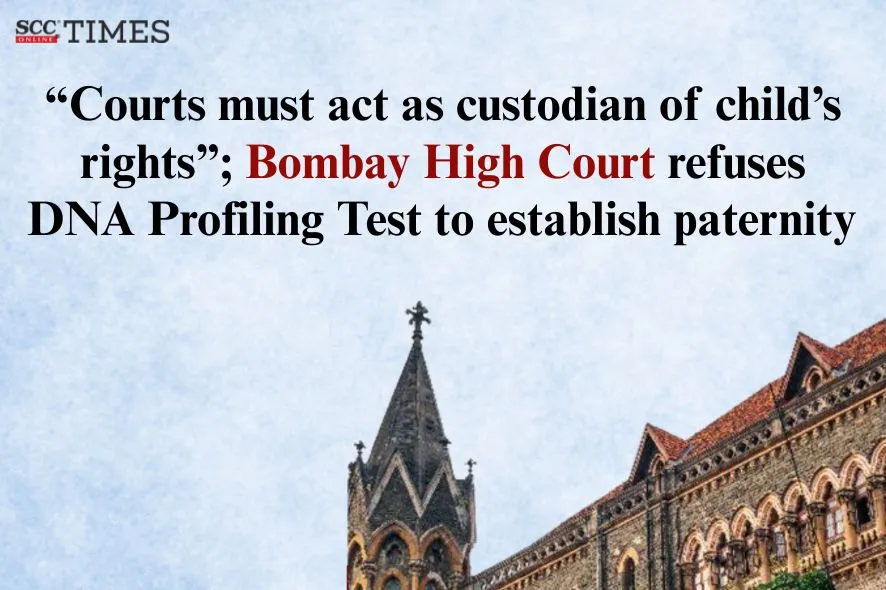Bombay High Court: The present writ petition was filed by the petitioner-wife, challenging the order of the Family Court which accepted the respondent-husband’s request for conducting DNA Profiling Test to decide the legitimacy of the child born to them. A Single Judge Bench of R.M. Joshi, J., set aside the Family Court order and held that it was the duty of the Court to consider pros and cons before calling upon the minor to undergo a blood or DNA test.
Background:
The parties got married on 18-12-2011. On 19-1-2013, when the wife left the matrimonial home, she was three months pregnant. The husband issued a notice to the wife on 28-1-2013, calling upon her to come back for cohabitation. Thereafter, a petition for judicial separation was filed by the husband on 8-2-2013, before the Family Court. The wife also filed a petition seeking restitution of conjugal rights. The husband then withdrew the proceedings filed for judicial separation and instead filed a petition for decree of divorce on the grounds of adultery, cruelty and desertion. The child was born on 27-7-2013.
The husband, doubting the chastity of his wife, filed an application for conducting DNA Test of the child, before the Judicial Magistrate First Class, Nagpur which was rejected. Again, at the stage of recording evidence, an application was filed by the husband for the DNA Test which was allowed by the Family Court. The wife, being aggrieved by that order, filed the present petition.
It was contended by the wife that the Family Court committed error in allowing the application merely because she accepted in her cross-examination that if the Court directed the DNA test of the child, she would abide by the same. The alleged admission could not be construed as her consent, and on such a presumption, the said application should not have been allowed. She further argued that DNA tests were conducted only in exceptional cases, and the present case was not exceptional. It was further submitted that the husband, nowhere pleaded that at the relevant time he had no access to the wife and that there was no physical relationship between them.
The husband supported the Family Court’s order and submitted that when the scientific full-proof method was available to decide the paternity of the child, such request should not have been declined. He further stated that he was ready to deposit an amount of Rs 1,00,000 by way of compensation, as directed by the Family Court, if the paternity test confirmed that he was the father of the child.
Analysis and Decision:
The Court opined that the presumption of conclusive proof of legitimacy of child under Section 112 of the Evidence Act, 1872 (‘Evidence Act’), casted greater burden on the man to show that the parties to the marriage had no access to each other, at any time when the child was begotten.
The Court relied on the Supreme Court’s decision in Aparna Ajinkya Firodia v. Ajinkya Arun Firodia, (2024) 7 SCC 773, wherein while interpreting Section 112 read with Section 4 of the Evidence Act, it was held that if a husband and wife were living together during the time of conception but the DNA test revealed that the child was not born to the husband, the conclusiveness in law would still remain irrebuttable. It would only prove adultery on the part of the wife, but the legitimacy of the child would still be conclusive. The presumption could only be rebutted by the proof of non-access at the time when the child was begotten, that is, at the time of its conception.
The Court took note that the husband knew of his wife’s pregnancy when she left the house and that even in the notice the husband did not make any allegation in respect of her not being pregnant out of the relationships between them. The Court further noted that, in the proceedings for judicial separation, there were no allegations made by the husband that he was not the father. Thereafter, in the divorce proceedings, only the adulterous behavior of the wife was alleged, and the paternity was not challenged.
The Court hence, noted that in none of the proceedings, the husband denied the paternity of the child and unless he disputed that he was not the father of the child, made out a specific case of having no access to the wife and rebutted presumption under Section 112 of the Evidence Act, question of determining the paternity of the child did not arise. The Court further observed that if there was an allegation against the wife that she lived an adulterous life, the said fact could be proved by any other evidence than calling upon the child to undergo the paternity test.
The Court observed that it was obligatory for the Court to consider the best interests of the child as he or she was not capable of making the decision in respect of the test. The Court opined that the child was only a tool in the fight between the parents, and therefore the Court should become the custodian of the rights of such minor child.
Therefore, the Court set aside the order of the Family Court and held that this was not a fit case to issue the direction for conducting the DNA test of child and that the Family Court erred in facts as well as in law while passing the impugned order.
[S v. S, 2025 SCC OnLine Bom 2623, decided on 1-7-2025]
*Judgment authored by: Justice R.M. Joshi
Advocates who appeared in this case :
For the Petitioner: M.P. Kariya, Advocate.
For the Respondent: S.S. Bhalerao, Advocate.


